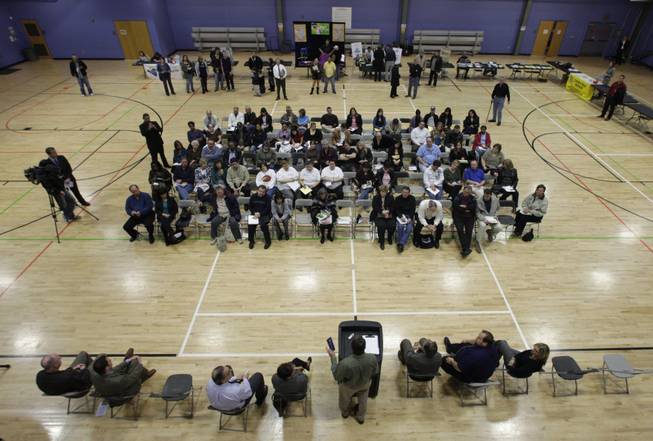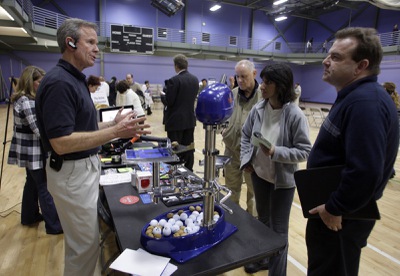
Business ABCs: Attendees learn about how to start or expand a business from a panel of experts during the Henderson Entrepreneur Fair.
Friday, March 12, 2010 | 3 a.m.
It seems like everyone wants to start a small business or be the budding entrepreneur these days — and many point to the economy as the reason.
Last month, more than 1,000 people attended an entrepreneur fair at the South Point, and dozens attended a similar fair a week later in Henderson.
“The reason there is so much interest now is because of job losses,” said Anna Siefert, operations manager of the Nevada Microenterprise Initiative, a nonprofit organization that funds small businesses up to $35,000 and provides technical assistance. “A lot of people still have their jobs, but don’t know how long they will have it. When people lose a paycheck, they want to be more in control of what they do. This is an opportunity to control their destiny.”
Budding small-business owners are reaching out in greater numbers for information on how to start a business and obtain funding, said Kevin Scanlon, head of the Henderson Library District reference department. Many people feel inspired that this is their chance to do something they always wanted to do, he said.
“They have lost their job or they are currently up against the wall because they might be losing their job. They are looking at what other avenues they have,” Scanlon said. “This is something they have had on the back burner their entire lives. They know this is the opportunity to seize this.”
Among those at the Henderson fair was Mike Roderick, 33, who already owns a retail shop at Town Square that sells protection shields for phones and iPods. Roderick started the business two years ago, but is looking for other opportunities.
“It has gone all right,” Roderick said. “We have felt the downturn like anybody else. I say I don’t want to participate in a bad economy, but my customers like to.”
Roderick said he wants to start a business that sells warranty programs for a vehicle’s appearance. He said he’s considering selling the existing business to help raise some of the capital needed for the operation, which amounts to about $150,000.
“We would be bootstrapping it,” Roderick said. “We need money, and we need the right location. And we need partners such as landlords willing to offer some incentives and manufacturers offering us better terms.”
Urica Figueroa of Henderson is looking for a new opportunity after operating a Jamaican cafe in downtown Las Vegas for three years. Figueroa said she closed in late 2008 because the property couldn’t get a liquor license. She said she considered moving, but the recession kept her from doing so.
Now, Figueroa said she wants to open a combination nightclub and restaurant with a Jamaican theme. The cost would be about $500,000, but it’s tough to get banks to lend that amount of money.
She does some catering on the side and waits for the opportunity to launch her business, despite the difficult odds in getting the money.
“I have faith,” Figueroa said. “I have the passion and desire. I went against the odds and got my first business open with little or no money. My capabilities exceed working for people. I am a leader. That would be taking 10 steps backward to work for people. If you don’t have a college degree in a specific field, what are you going to do? I have to work for me.”
Siefert said people shouldn’t be discouraged about starting a business during a weak economy. What’s important is that they do their due diligence, she said.
“When the economy is good, people jump in with both feet without their due diligence,” Siefert said. “Those businesses are in trouble. They didn’t plan it. I think whoever goes into business now will be solvent. They only have a certain amount of money, and they know the economy is tough and do more to dot the i’s and cross the t’s before they jump into it.”
Dennis Wengert, Small Business Administration’s deputy director in Nevada, said the biggest danger that entrepreneurs face is they “don’t know what they don’t know,” which can lead to their demise.
“Those gotcha moments are what get people in trouble,” Wengert said. “The most important is that everything costs twice as much as you thought it was going to take and takes three times as long. It is amazing the number of enterprises that project cash flows to break even in six months. Why would they think they would be profitable so quickly, especially in a slow economy?”
Another big mistake startups make is whether there is a market for what they want to do, Wengert said. They confuse marketing with market, but they also confuse population with market.
“Just because there are 200,000 people that live within three miles of where you want to open your doors doesn’t mean all of them are prospective customers. Most people don’t understand that there is research that has to be done to verify that a market even exists for what they want to do.”
Despite the recession, opportunities still exist because potential competitors have gone out of business, Wengert said. Many didn’t understand how to adapt their business to deal with the slow economy, he said.
The recession means more people to choose from as employees because so many are out of work, Wengert said. Lease rates are better because of office, retail and industrial space vacancies, he added.
“There are opportunities where basic necessities and services are always going to be needed, and in some cases are needed to a greater extent when times are tough,” Wengert said. “People fall back on spending their money on where they know they are going to get the greatest value. Those are usually going to be basic goods and services they use every day.”
The difficulty in starting a business, however, is money because it’s difficult to obtain financing, Wengert said. Historically, most people have used the equity in their homes as collateral for business loans. That’s not an option today because 80 percent of Las Vegas homes are underwater, he said.
Existing businesses are having trouble getting financing as well because they don’t have the cash flows to support the debt on the loan, he said.
A good idea will work even in this economy, Wengert said. The problem is that 80 percent of the ideas that people have for businesses aren’t viable.
Businesses need to find a niche in terms of product or services that is targeted to a specific type of prospect, he said.
“If you have something unique that can be trademarked, patented or protected through intellectual property rights that prevent other people from duplicating what you are doing, you can enter the market with some kind of momentum and some kind of sustained viability that helps you generate a viable business over the long run.”
Siefert said there’s been a lot of interest in janitorial services and handyman services. Many are even interested in serving as consultants to use their expertise from their corporate career, she said.
Technology-focused businesses offer some of the best opportunities, Wengert said.
Those that have the best chance are startups that require as little capital as possible or have a product that is inexpensive to produce, he said.
Many people start businesses from their home or do it on the side of their regular job, Wengert said. In some cases, it starts as a hobby, and they get so much demand from family and friends that it turns into a viable business, he said.
“People are always looking for ways to capitalize on what they know and do,” Wengert said. “There are a lot of opportunities out there. If they approach it the right way and if people are willing to take their time and do it right, they can get by without a large amount of capital injection. They will be fine until the economy starts to turn. Then banks will be more open to a greater range of fund opportunities because they have been hurt as well.”



Join the Discussion:
Check this out for a full explanation of our conversion to the LiveFyre commenting system and instructions on how to sign up for an account.
Full comments policy